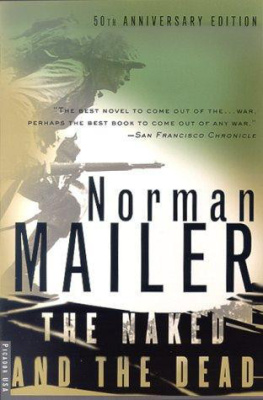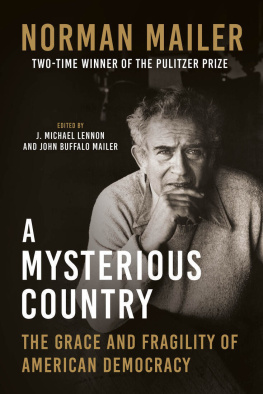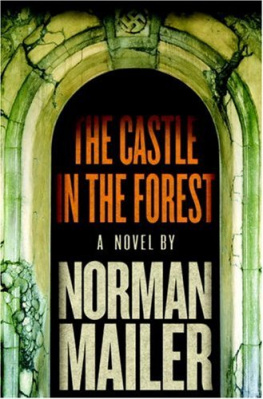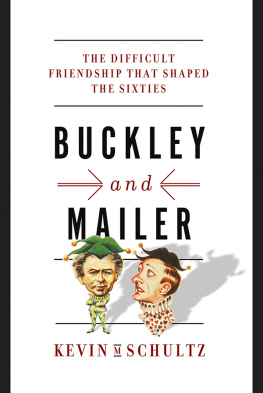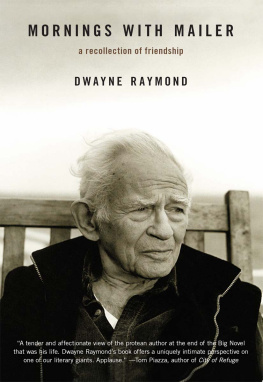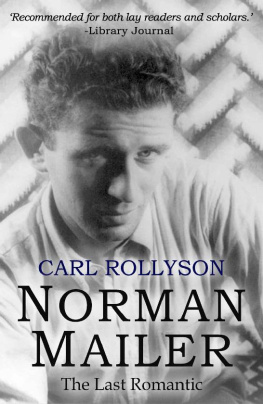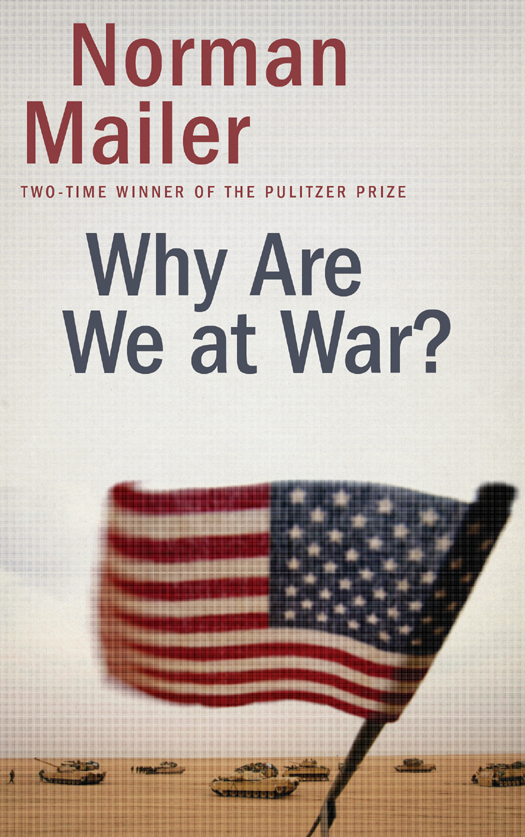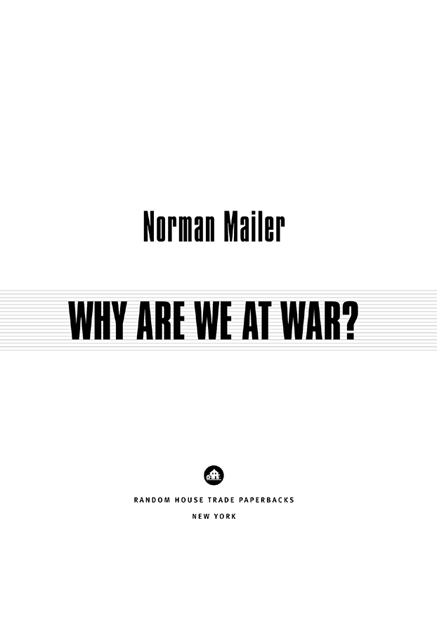Praise for Norman Mailer
[Norman Mailer] loomed over American letters longer and larger than any writer of his generation.
The New York Times
A writer of the greatest and most reckless talent.
The New Yorker
Mailer is indispensable, an American treasure.
The Washington Post
A devastatingly alive and original creative mind.
Life
Mailer is fierce, courageous, and reckless and nearly everything he writes has sections of headlong brilliance.
The New York Review of Books
The largest mind and imagination at work [in modern] American literature Unlike just about every American writer since Henry James, Mailer has managed to grow and become richer in wisdom with each new book.
Chicago Tribune
Mailer is a master of his craft. His language carries you through the story like a leaf on a stream.
The Cincinnati Post
2013 Random House eBook Edition
Copyright 2003 by Norman Mailer
All rights reserved.
Published in the United States by Random House Trade Paperbacks, an imprint of The Random House Publishing Group, a division of Random House LLC, New York, a Penguin Random House Company.
R ANDOM H OUSE and the H OUSE colophon are registered trademarks of Random House LLC.
Originally published in trade paperback in the United States by Random House Trade Paperbacks, an imprint of The Random House Publishing Group, a division of Random House LLC, in 1997.
Portions of this work were originally published in interviews that appeared in the following publications: I Am Not for World Empire: A Conversation with Norman Mailer about Iraq, Israel, the Perils of Technology and Why He Is a Left-Conservative, from The American Conservative, December 2, 2002, and an interview with Dotson Rader from The Sunday Times Magazine (UK), September 19, 2002. In addition, portions of this work were originally given as a speech delivered by Norman Mailer at the Commonwealth Club on February 20, 2003.
Grateful acknowledgment is made to Copyright Clearance Center for permission to reprint an excerpt from US Technological Supremacy Is in Danger by Scott A. Bass from The Boston Globe, February 1, 2003, copyright 2003 by Globe Newspaper Co (MA). Reproduced with permission of GLOBE NEWSPAPER CO (MA) in the format Trade Book via Copyright
Clearance Center.
eISBN: 978-0-8129-8602-0
www.atrandom.com
v3.1
CONTENTS
Part I
IX/XI
PREFACE
As you will see by turning the page, this book begins with an account by my old friend Dotson Rader of his experiences during the morning and afternoon of 9/11.
One year later, we got together to do an interview for the London Sunday Times Magazine about the reverberations of that event upon American life. I remember the stimulation, the kick-start if you will, that was provided by Dotsons eloquence on the subject. Before it was over, I talked a great deal that day, and much of it is reprinted here, as well as a number of remarks I have added to what was said then and have been thinking about since.
9/11 is one of those events that will never fade out of our history, for it was not only a cataclysmic disaster but a symbol, gargantuan and mysterious, of we know not what, an obsession that will return through decades to come.
Indeed, this book, which looks to give some fresh notion of why America is in a state of war with Iraq, would have no existence without the fall of the Twin Towers, and so it seemed appropriate to begin with Dotson Raders description of what must have been the most surrealistic morning in the archives of New Yorks history.
DOTSON RADER : I was at home in my apartment on East Eighty-fifth Street in Manhattan when the first of the Twin Towers was hit by one of the planes. But at the time I didnt know it had happened. Later that morning I tried to make a phone call, and my phone was dead. So I got dressed and went outside. I live four blocks from Gracie Mansion, the official residence of the mayor. None of the pay phones on the street worked. People were wandering oddly about, sort of dazed, as if kind of lost. It was very strange. I started walking downtownit was a bright, almost hot day in New York. I was supposed to have lunch with a friend on Fifty-seventh Street, and I was walking down Third Avenue to meet him at the restaurant. When I reached Sixty-fourth Street, I noticed this huge, bubbling cloud in the sky above Manhattan south of me. The rest of the sky was blue and clear. I didnt know what it was. And then, looking down Third Avenue, six or seven blocks away, as far as I could see, I suddenly noticed a vast throng of people, a flood of humanity, like a slow wave rolling north up the avenue. Many of them were men in white shirts. They were the office workers from Wall Street, fleeing the disaster. This quiet mass of people, tens of thousands, was walking up the island like a funeral procession and turning at Fifty-seventh Street and then moving as one toward the 59th Street Bridge to cross over out of the island. And I thought, Jesus! Is this Christs Second Coming? Because they were in white, covered in dust, and they looked stunned, and they were speaking in whispers, like kids in church. I thought it was the Rapture and Jesus was calling his saints home, and that I was being left behind. That was my initial feeling.
NORMAN MAILER : Wouldnt that be it? Jesus had come and everybody has gone to meet him by crossing the bridge from Manhattan to Queens. That does capture my pessimism concerning cosmic matters. [laughter]
DOTSON RADER : Okay. Where were you on September 11? How did you learn about the terrorist attacks, and what was your initial reaction?
NORMAN MAILER : I was in my house up here in Provincetown. I remember a phone call telling me to turn on the TV. While I was watching I called my youngest daughter, Maggie. I have an apartment in Brooklyn Heights, and she was staying there with a friend. You can see lower Manhattan and the Twin Towers from that apartment. Our windows look across the East River. So Maggie had witnessed the first attack and was terribly affected by it. Then, while we were on the phone, the second plane hit the other building. Im still watching on TV. In Brooklyn, Maggie and her friend are both seeing it through the window as well as viewing it on TV. That was a considerable shock. Why? Because the one thing TV always promises us is that, deep down, what we see on television is not real. Its why theres always that subtle numbness to TV. The most astonishing events, even terrifying events, nonetheless have a touch of nonexistence when seen on the tube. They dont terrify us. We see something thats hideous, but were not shocked proportionally. Its why we can watch anything on TV.
Now, there are exceptions. The shooting of Lee Harvey Oswald by Jack Ruby was one; the second plane striking the second Tower; the collapse of the Towers. TV at that moment was no longer a coat of insulation between us and the horrific. When broken, the impact is enormous.
DOTSON RADER : What struck me, what Ill never forget, is the silence. Everyone was just silent. Or if they spoke, they whispered. It was like everyone was at a funeral. And this went on for hours and hours. Occasionally, the silence was broken by an ambulance or police siren. And what Id never seen in New York beforemilitary jets started flying over the island, because they started closing Manhattan down. The military started showing up in the streets. I thought, What in Gods name is happening?


